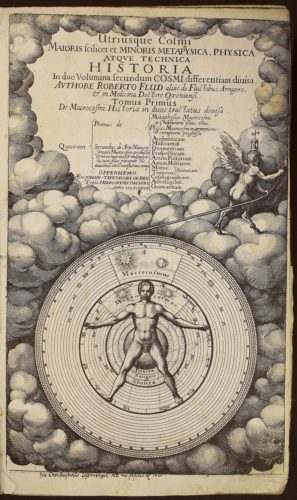In Renaissance thinking, the human body was related to the entire cosmological system, both analogously and literally. Astrologers could cast charts detailing the relative positions of the planets at the time of an individual’s birth, which, properly interpreted, would yield insights into the trajectory of their life. The interrelation between human beings and the universe is illustrated here by Robert Fludd, who explains: ‘Man is a whole world of its own, called microcosm for it displays a miniature pattern of all the parts of the universe’. For a society which believed that man held a privileged position in God’s creation, advances in scientific knowledge held the promise not only of greater understanding of the material world, but (to borrow Milton’s words) of justifying the ways of God to men.
© 2019 University of Cambridge and Fitzwilliam Museum











